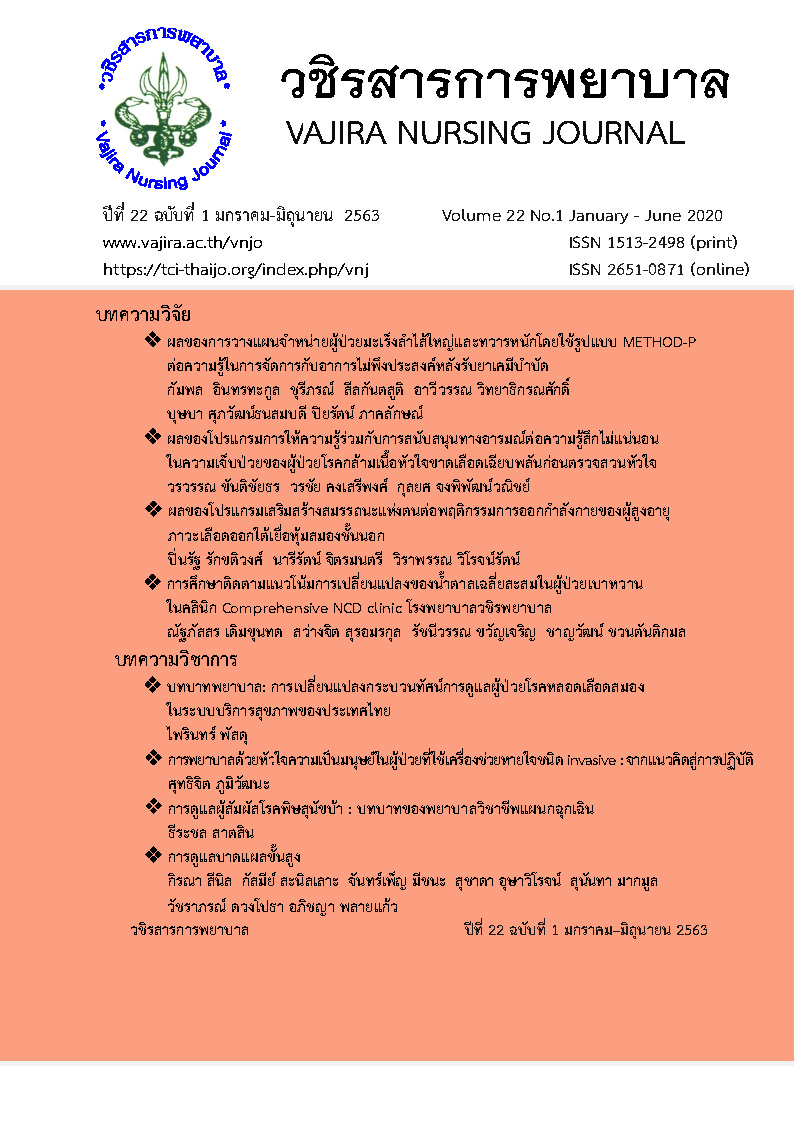Nursing roles: paradigm shift in stroke care in the health care system in Thailand
Main Article Content
Abstract
Nurses are important personnel to drive healthcare system in Thailand. They perform duties not only as operators but they have to develop nursing science to be updated and suitable with current social changes as well as complexity of diseases, persons and technology to construct specific nursing know-how for healthcare. It is in accordance with a concept of taking care of patients having stroke that at present, it is highly advanced in terms of treatment, disease factors, and access to healthcare system. If the nurses understand and adapt themselves for changing paradigms in every dimension including 4 aspects: individuality, culture, family and community as well as characters lying inside and outside persons, religion, culture, society, policy and economy related to human’s health and processes of alive or dying persons, the roles of nurses in connection with providing care for stroke patients at every level of health service system in Thailand will be successful with decreased occurrences. Furthermore, people will be able to take care of themselves and have better quality of life.
Article Details
เนื้อหาและข้อมูลในบทความที่ลงตีพิมพ์ในวชิรสารการพยาบาลถือเป็นข้อคิดเห็นและความรับผิดชอบของผู้เขียนบทความโดยตรง ซึ่งกองบรรณาธิการไม่จำเป็นต้องเห็นด้วย หรือร่วมรับผิดชอบใด ๆ ทั้งสิ้น
บทความ ข้อมูล เนื้อหา รูปภาพ ฯลฯ ที่ได้รับการตีพิมพ์ในวชิรสารการพยาบาล ถือเป็นลิขสิทธิ์ของวชิรสารการพยาบาล หากบุคคลใดหรือหน่วยงานใดต้องการนำทั้งหมดหรือส่วนหนึ่งส่วนใดไปเผยแพร่ต่อหรือเพื่อกระทำการใด ๆ จะต้องได้รับอนุญาตเป็นลายลักอักษรจากวชิรสารการพยาบาลก่อนเท่านั้น
References
กีรติ บุญเจือ. (2521). ปรัชญาเบื้องต้น. กรุงเทพฯ : โรงพิมพ์ไทยวัฒนาพานิช.
ชาย โพธิสิตา. (2549). ศาสตร์และศิลป์แห่งการวิจัยเชิงคุณภาพ. พิมพ์ครั้งที่ 2. กรุงเทพฯ: อมรินทร์พริ้นติ้งแอนด์พับลิชชิ่ง.
ปรีชา ช้างขวัญยืน. (2549). ปรัชญากับวิถีชีวิต. กรุงเทพฯ: สำนักงานคณะกรรมการการอุดมศึกษา.
พระธรรมโกศาจารย์. (2550). ปรัชญากรีก: บ่อเกิดภูมิปัญญาตะวันตก. (พิมพ์ครั้งที่ 6). กรุงเทพฯ: สำนักพิมพ์ศยาม.
รัตนะ บัวสนธ์. (2551) .ปรัชญาวิจัย. กรุงเทพฯ : สำนักพิมพ์แห่งจุฬาลงกรณ์มหาวิทยาลัย.
ศิริพร จิรวัฒน์กุล. (2552). การวิจัยเชิงคุณภาพด้านวิทยาศาสตร์สุขภาพ.กรุงเทพฯ: วิทยพัฒน์.
สงวน นิตยารัมภพงศ.์ (2556). การบริหารระบบสุขภาพในท้องถิ่นกับอนาคตระบบสุขภาพไทย. นครปฐม:สถาบันพัฒนาการสาธารณสุขอาเซียน มหาวิทยาลัยมหิดล.
สมจิต หนุเจริญกุล. (2544). ศาสตร์ทางการพยาบาล. ใน การพยาบาล : ศาสตร์ของการปฏิบัติ. พิมพ์ครั้งที่ 2. กรุงเทพฯ: วี.เจ.พริ้นติ้ง.
สุภางค์ จันทวานิช. (2552). ทฤษฎีสังคมวิทยา. (พิมพ์ครั้งที่ 2). กรุงเทพฯ: สำนักพิมพ์แห่งจุฬาลงกรณ์มหาวิทยาลัย.
อารีย์วรรณ อ่วมตานี. (2553). การวิจัยเชิงคุณภาพทางการพยาบาล.กรุงเทพฯ: โรงพิมพ์จุฬาลงกรณ์มหาวิทยาลัย.
อุดม บัวศรี, (2544) .ปรัชญา. กรุงเทพฯ : สำนักพิมพ์แห่งจุฬาลงกรณ์มหาวิทยาลัย.
Anne, B., Lori, R. and Angela, L. (2014). Understanding Philosophy in a Nurse’s World: What, Where and Why?. Nursing and Health, 2(3): 65-71.
Brink, H. (1992). The science of nursing: current issues and dilemmas. Curationis, 15 (2); 12-19.
Butts, B. J and Rich, L. K. (2015). Philosophies and theories for advanced nursing practice. (2 nd ed.). Burlington, MA: Jones & Bartlett Learning.
Cody, W. K. (2013). Philosophical and theoretical perspectives for advanced nursing practice. (5th ed.). Burlington, MA : Jones & Bartlett Learning.
Dahnke, M. D. and Dreher, M. H. (2011). Philosophy of science for nursing practice : concepts and application. New York : Springer Pub.
DeWitt, R. (2010). Worldviews : an introduction to the history and philosophy ofscience. (2nd ed.). Chichester, West Sussex, U.K. ; Malden, MA : Wiley-Blackwell.
Edwards, S.D. (1997). What is philosophy of nursing. Journal of Advanced Nursing, 25: 1089-1093.
Edwards, S.D. (2001). Philosophy of nursing : An introduction. New York: Palgrave Publishers.
Jan, R., Ian, G. (1997). Philosophy for nursing. London: Arnold.
Leaman, O. (2000). Eastern philosophy: key reading. London: Routledge.
Meleis, A. I. (2012). Theoretical nursing: Development & progress. (5th ed). Pennsylvania: Wolters Kluwer Health Lippincott Williams & Wikins.
McEwan, M. & Will, E. M. (2011). Theoretical basis for nursing. (3th ed).Philadelphia: Wolters Kluwer Health Lippincott Williams & Wikins.
McEwan, M. and Will, E.M. (2014). Theoretical basis for nursing. (4th ed). Philadelphia: Wolters Kluwer Health Lippincott Williams & Wikins.
Rodgers, B. L. (2005). Developing Nursing Knowledge: Philosophical Traditions and Influences. Lippincott Williams & Wilkins.


